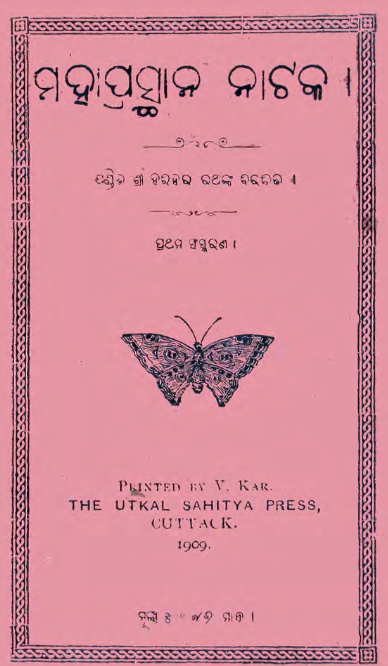Published in 1909, Mahaprasthana Nataka, authored by the esteemed playwright Harihara Rath, stands as a monumental achievement in Odia literature and theatre. This drama not only reflects the socio-political milieu of its time but also intricately weaves the rich tapestry of Odia culture, spirituality, and human emotions.
Mahaprasthana Nataka, whose title translates to The Great Departure, derives its essence from the ancient Indian epic, the Mahabharata. The play captures the poignant moment of the Pandavas’ final journey towards the Himalayas, symbolizing their quest for truth, righteousness, and liberation. The narrative unfolds with a focus on the inner struggles of the characters as they confront their past, moral dilemmas, and the weight of their actions in the grand tapestry of life.
The central theme of the play revolves around the concept of dharma (duty/righteousness) and the inevitable journey of life toward mortality. It underscores the idea that every life must culminate in a reckoning of one’s deeds and the legacy one leaves behind. Through the characters’ dialogues and interactions, Rath explores various dimensions of human experience—love, sacrifice, betrayal, and redemption.
Rath’s characterization in Mahaprasthana Nataka is profound, showcasing an array of personalities that paint a comprehensive picture of the human condition. The Pandavas, while embodying courage and virtue, also grapple with their weaknesses, insecurities, and the heavy burden of their choices. Each character represents different facets of life, and their collective journey serves as a metaphor for the quest for self-realization and enlightenment.
The symbolic elements woven into the drama further enhance its narrative depth. The Himalayas symbolize the ultimate truth and the aspirations of the soul, while the river, often referenced in Indian lore, represents the flow of time and the transient nature of life. Through these symbols, Rath elevates the play’s philosophical underpinnings, urging the audience to reflect on their own journeys.
Mahaprasthana Nataka holds a significant place in the history of Odia theatre and literature, marking a shift towards more profound dramatic expressions that transcend mere entertainment. It reflects the socio-political currents of early 20th-century Odisha, where the struggle for identity and cultural revival was paramount. Rath’s work resonates with a growing consciousness among Odia writers to explore themes that reflect the aspirations and anxieties of society, making it a precursor to later literary movements.
Moreover, the play’s language, rich in lyrical beauty and poetic resonance, showcases Rath’s command over Odia, succeeding in elevating the nuances of dialogue and enhancing the emotional impact of the narrative. The rhythmic interplay of words creates an engaging theatrical experience that captivates audiences and leaves a lasting impression.
Books Info
| Books name | Mahaprasthana Nataka / ମହାପ୍ରସ୍ଥାନ ନାଟକ |
| Author | Harihara Rath |
| No Of pages | 56 |
| Publisher | NA |
| Publication | 1909 |
| Printed At | The Utkal Sahitya Press |
| Distributor | NA |

